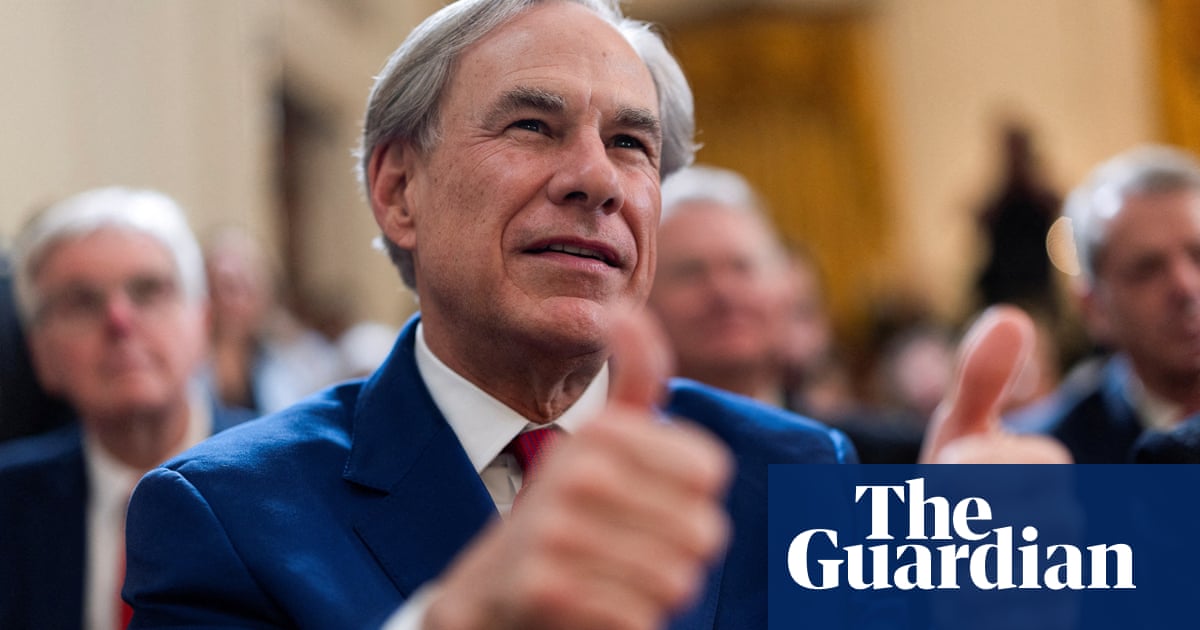The Texas governorGreg Abbotton Saturday signed a law making more than 5 million students eligible to use state funds for private schools, a watershed moment in the conservative campaign to remake public education in the US.
Texas is allocating $1bn for the first two years of the program to offer parents vouchers to pay for school. It is the 16th state to make all students eligible to receive public funds for private education.
“Today is the culmination of a movement that has swept across our state and across our country,” Abbott said during a signing ceremony at the governor’s mansion. “The day has arrived that empowers parents to choose the school that’s best for their child.”
The so-called universal school choice programs are all in states whose legislatures are dominated by Republicans, who for years have accused public schools of indoctrinating children with liberal ideology.
Advocates say school vouchers put control of children’s education into the hands of parents. Opponents say they drain money from public schools and predominantly benefit wealthier children. More than 1 million US students use state money or benefit from tax credits to pay for private school, according to EdChoice, an advocacy group supporting vouchers. The new Texas law means all 5.3 million children in the state’s elementary and high schools are eligible for vouchers, far more than in any other US state. Texas has the country’s second-largest public education system. About 50 million students are taught in public schools across the US, according to federal data. Donald Trump signed executive orders in January directing the Department of Education to prioritize federal funding for school choice programs and instruct states on how to use federal grants to support private and religious schools.
Trump strongly supported the Texas bill and repeatedly urged legislators to pass it. Most Texas students are now eligible for up to $10,000 a year to attend private schools beginning in the 2026-27 school year. The law requires private school students to take a nationally recognized standardized test, and annual audits of schools that accept vouchers. No more than 20% of the voucher program spending can go to families making 500% or more of the federal poverty limit, which amounts to a household income of about $160,000 for a family of four.
Supporters have pushed for school vouchers in Texas for more than 30 years. Until this year, Democratic opponents allied with rural Republicans who cited concerns that funding private schools would drain funds from public districts in small towns with few private schools.
Abbott organized pro-school-choice Republicans to challenge anti-voucher Republicans in primaries in last year’s elections. His efforts helped unseat 15 incumbent Republican House members.
“No other governor has led on school choice like Governor Abbott,” said Jorge Borrego, the K-12 education policy director at the conservative Texas Public Policy Foundation.
Borrego noted that Abbott had also pushed the legislature to hike public school funding. A separate bill passed by the Texas House and sitting before the Senate would hike funding for public schools by $7.7bn over the next two years.
The new funding would certainly be welcomed, said Libby Cohen, executive director of Raise Your Hand Texas, an education advocacy group long opposed to vouchers.
“But what’s important to keep in context is, for public schools to simply keep up with inflation since 2019, they would need just shy of $20bn in new school funding,” she said.
Texas ranks 47th in the country in per-pupil spending, according to the National Education Association’s annual report released this week.
Texas schools receive funding based upon how many students they have, as is typical across the US. If public schools lose students to private educators because of vouchers, they will lose money, Cohen said.
Randi Weingarten, president of the American Federation of Teachers union, said the Trump administration is “threatening to slash funding to the neediest students” by withholding federal money for schools that engage in diversity, equity and inclusion efforts.
The Texas law will send “billions of dollars to private schools that can pick and choose who they educate”, she said.
Jon Valant, director of the Brookings Institution’s Brown Center on Education Policy, said the push for universal voucher systems in conservative states is more worrying than Trump’s effort to shut the Department of Education.
Voucher payments rarely cover the full cost of private schools, meaning only richer families can participate, he said. “That could mean we end up with a terribly stratified school system where those who can afford to pay the difference are in a wealthy private system, while the public school system is left to crumble.“
In a joint statement from the conservative Heritage Foundation thinktank, Lindsey Burke, director of its Center for Education Policy, and research fellow Jason Bedrick said the law “empowers families to choose the learning environments that align with their values and work best for their children”.
